tradeswomen
Statement on the Tragic Loss of Minnesota Tradeswoman Amber Czech
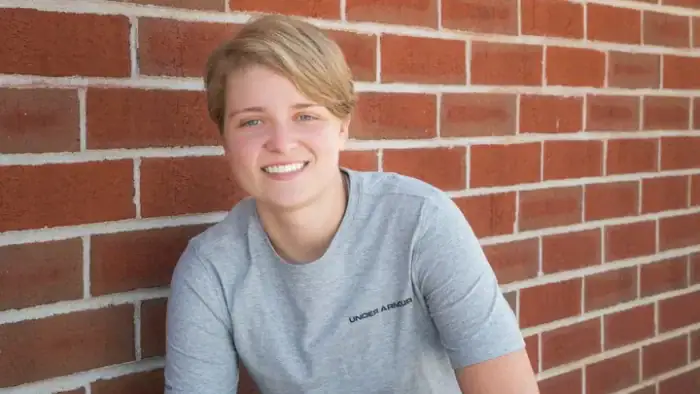
We at Oregon Tradeswomen are devastated by the loss of yet another tradeswoman due to gender-based violence while at work. Amber Czech was a 20-year-old welder in Minnesota who was murdered by a male coworker on the job. Amber was new in her career as a welder and had a bright future that was stolen from her. We extend our deepest condolences to Amber’s family, friends, and community. Nobody should ever lose their life for simply going to work. Yet, her death is a stark reminder of the reality of gender-based violence, violence that follows women even into the workplace.
For us, our community, and tradeswomen at large, this tragedy hits close to home. This is not the first act of gender-based violence on the job we have suffered as a community, but we hope it is the last. As we continue to process this loss, we cannot fail to underscore what we already know: the skilled trades industries have significant work to do to ensure that women are not only able to find jobs in the trades, but that they are truly respected and safe when they show up to work to give it their all.
Nevertheless, we urge you to lean into your community to give and receive support during this difficult time. Additionally, if something feels off or unsafe at work, do not hesitate to report your concerns, whether that is to your foreman, your union, your company’s HR department, or even a trusted ally. Your safety is paramount, and while it should not be your responsibility to feel safe from violence at work, the reality is that hypervigilance may save a life. Speaking directly to our male allies, please look out for your sisters in the trades. You have the power to shut down and speak out against toxic workplace culture. You can be the change that puts an end to this senseless violence.
Oregon Tradeswomen urges our community to join us in celebrating Amber’s young life and supporting her family by contributing to her GoFundMe campaign: https://www.gofundme.com/f/amber-czech
Additionally, if you are struggling right now, please check out this list of resources for help:
- Call or Text 988, or visit 988 Lifeline’s website for mental health crisis chat support
- Oregon Crisis Text Line: Text “OREGON” to 741741
- NAMI Oregon Mental Health Resources Helpline: 1-800-343-6264
- National Domestic Violence Hotline: 1-800-799-7233
- National Sexual Assault Hotline: 1-800-656-4673
- Call For Safety Portland: 503-235-5333
- Lines for Life Alcohol and Drug helpline: 1-800-923-4357
C2P2: Building a Stronger, More Inclusive Construction Workforce
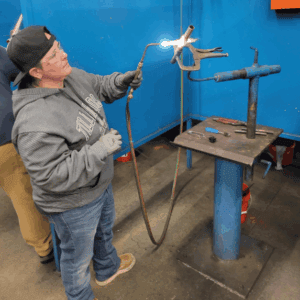 A strong and diverse workforce is essential to building healthy, resilient communities, and Oregon Tradeswomen is proud to be part of the regional collaboration making that vision a reality.
A strong and diverse workforce is essential to building healthy, resilient communities, and Oregon Tradeswomen is proud to be part of the regional collaboration making that vision a reality.
Across the greater Portland area, demand for skilled tradesworkers is on the rise. Over the next decade, 22,000 construction jobs are expected to open as major public infrastructure projects move forward. Yet, the workforce is shrinking and aging… 22% of current workers are nearing retirement, while only 8% of new workers are under 25. At the same time, many aspiring tradespeople face barriers to entering and staying in the field, from access to affordable and reliable childcare and transportation, to jobsite harassment and limited mentorship opportunities.
Led by local public agencies who have made policy commitments, and supported by organizations like Oregon Tradeswomen, Construction Career Pathways (C2P2) is a regional strategy to grow and diversify the construction workforce. By investing in pre-apprenticeship training, apprenticeship access, and on-the-job retention supports, this collaborative effort is ensuring that women and BIPOC job-seekers have equitable opportunities to build rewarding, family-wage careers in the trades.
At Oregon Tradeswomen, we see every day how breaking down these barriers changes lives, not just for individual workers, but for families and communities across our region. When more people can succeed in the trades, we all benefit from stronger infrastructure, greater economic resilience, and a workforce that reflects the diversity of our community.
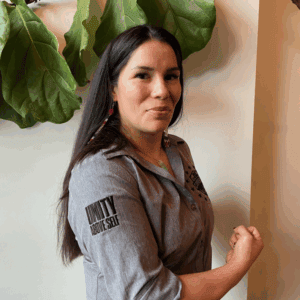
Metro Regional Government’s new Construction Careers Pathways Regional Dashboard highlights the real impact of these efforts, including hard data and compelling stories demonstrating the progress being made to build a better future for all workers. You can also discover active and completed public projects impacted by these efforts.
Visit the dashboard to learn more about how Oregon Tradeswomen and our partners are helping to shape a strong, inclusive, and sustainable construction industry for our region’s future.
OTW Pre-Apprentices at Habitat for Community Build Day
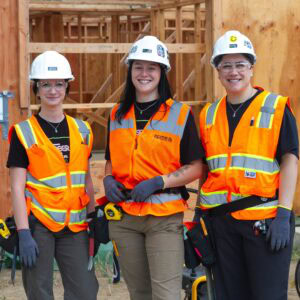
This September, three Oregon Tradeswomen pre-apprentices from the Summer 2025 TACC cohort were given the opportunity to participate in a Community Build Day at Habitat for Humanity‘s Myrtlewood Way job-site in Gresham alongside pre-apprentices from Constructing Hope. This Community Build Day was hosted by our friends at Danner Boots with the goal of highlighting young tradesworkers, also known as “the Toolbelt Generation,” in hopes of inspiring Gen-Z and Gen-Alpha youth to consider careers in the skilled trades. Skilled trades careers offer high wages and many diverse career pathways that are accessible to anyone ready to work hard, as well as high levels of career satisfaction.
Our pre-apprentices Ella, Jess, and Bre spent the day working shoulder-to-shoulder with skilled Habitat tradesworkers in addition to other pre-apprentices, learning new carpentry techniques and building upon the foundation that they have formed throughout their time in the TACC program. This experience gave these three students a taste of what their future could look like, building their communities alongside a solid team of tradesworkers, and left them excited for what is to come after they complete their pre-apprenticeship.
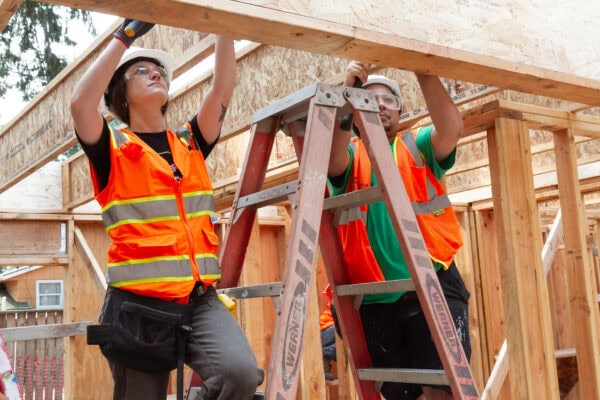
There are many opportunities to get involved and develop your building skills like our three pre-apprentices did. If you are looking to skill-up while contributing your time to a great cause, Habitat for Humanity is looking for more volunteers for the Myrtlewood job-site. Learn more about volunteering with Habitat here!
Oregon Tradeswomen is Made For This
Made For This is a new initiative coming from KGW, Portland’s local NBC channel, that aims to highlight career options in the skilled trades! After decades of societal messaging that reinforces the idea that going to college is the only way to start a good career, KGW is working to change that narrative by promoting alternative pathways to meaningful careers such as pre-apprenticeship and registered apprenticeship. These career pathways offer transferable skills, paid on-the-job training, and come without the burden of college debt.
Through a partnership with Oregon’s Bureau of Labor and Industry (BOLI) and the Oregon Department of Transportation (ODOT), Oregon Tradeswomen was given the spotlight to feature our Trades and Apprenticeship Career Class (TACC) and one of our successful pre-apprenticeship graduates for Made For This.
Our first venture with Made For This was a promotional video that featured union Laborer with LiUNA Local 737 Kaysha Yarnell. Kaysha is an Oregon Tradeswomen graduate who recently completed her apprenticeship with LiUNA. We had a lot of fun filming Kaysha at the Laborer’s Training Center as she works alongside her fellow Laborers. Watch Kaysha’s video…
Oregon Tradeswomen staff was also invited to join host Lacey Evans on Hello Rose City, KGW’s morning show highlighting the latest trends in Oregon and SW Washington. Our Training Manager Zoe Stansbury and Admissions Coordinator Elle Madison went live on August 21st to spread the word about Oregon Tradeswomen’s TACC program and how TACC can help women jumpstart their careers in the skilled trades. Check out Oregon Tradeswomen on Hello Rose City…
We are so grateful to BOLI, ODOT, and KGW for the opportunity to highlight the work we do at Oregon Tradeswomen and give visibility to women in the trades. With this industry being disproportionately male-dominated, every ounce of representation makes a huge difference to show that women are Made For This!
Now More Than Ever: Join The Builders and Stand With Trillium
We are in a critical moment, not just as an organization, but as a movement.
At Oregon Tradeswomen, we’ve spent more than three decades breaking down barriers for women and gender minorities in the skilled trades. But today, the political climate is threatening everything we’ve built.
As a nonprofit rooted in equity and inclusion, we’ve felt the direct impact of recent political attacks on DEI efforts. Several of our largest grants have either been rescinded or put on hold due to legal challenges, jeopardizing the programs that empower our students and sustain our mission.
In the face of this instability, we’re launching The Builders. A new community of monthly donors who are stepping up to help us weather this storm. Monthly giving allows us to plan ahead, keep our programs running, and continue offering life-changing training at no cost to our students.
Here’s what that impact looks like:
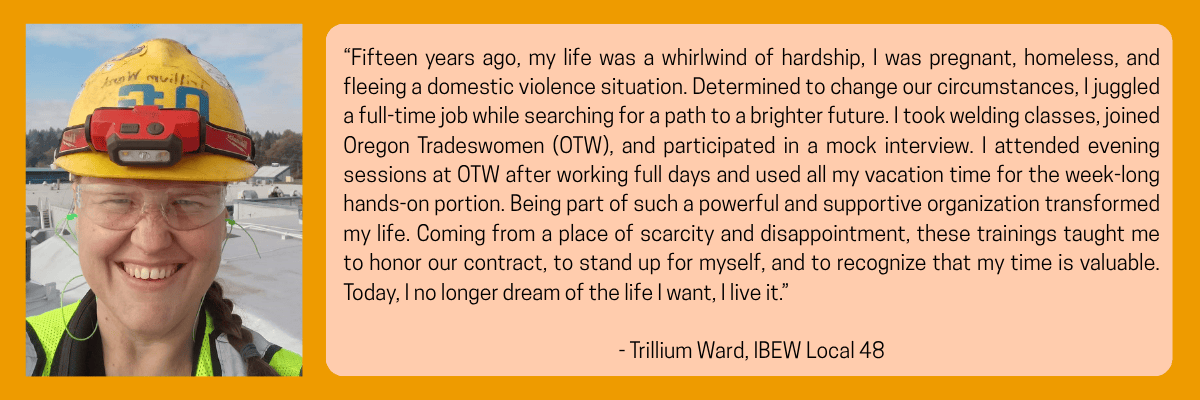
By joining The Builders, you’re not just giving monthly; you’re helping protect access, opportunity, and economic justice for the people who need it most. Even $5/month makes a meaningful difference.
Be part of the foundation that holds us together in hard times. Join The Builders today: Become a Monthly Donor
Women are the Key to the Future of Construction
Oregon Tradeswomen, in partnership with the U.S. Department of Labor Women’s Bureau and Portland Community College (PCC), celebrated Women in Construction Week at our “We Are the Key” event on March 4th! With the theme of this year’s Women in Construction Week being “Keys to the Future,” tradeswomen and advocates from across the industry gathered to talk about why Oregon women are the key to the future.
Hari Chon, Program Analyst for the U.S. Department of Labor Women’s Bureau, opened the event by sharing the origins of the Women’s Bureau back in 1920, two years before women got the right to vote. Established by the U.S. Department of Labor, the Women’s Bureau was formed to promote the welfare of women and advancing opportunities for women in the workforce. Through research and grants such as the Women in Apprenticeship and Non-Traditional Occupations (WANTO), the Women’s Bureau is actively working in alignment of Oregon Tradeswomen’s vision to improve and increase women’s participation in high-skill, high-wage union careers in the skilled trades. Oregon Tradeswomen is grateful for Hari and the Women’s Bureau for their support.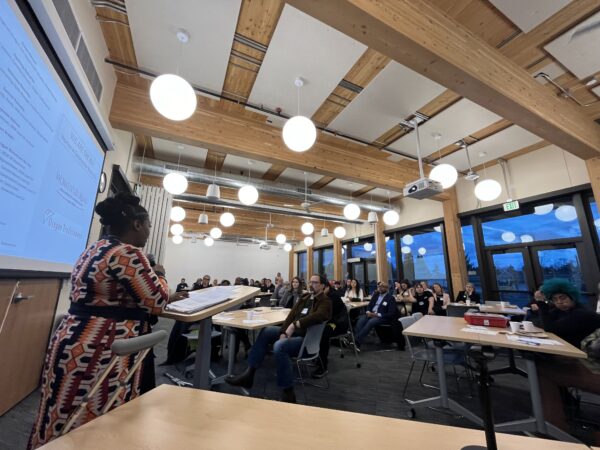
The event took place at Portland Community College’s new Opportunity Center, a space built in alignment with project labor agreements ensuring the work was done with diversity, equity, and inclusion in mind. Amy James Neel, Workforce & Contracting Equity Manager for Portland Community College, detailed that PCC incorporated voices from the community in the design and planning of this project, and worked with contractors, subcontractors, dispatchers, union halls, and apprentice coordinators to maximize opportunity and access for women and BIPOC workers to earn a living wage in these careers. In fact, 10,599 (51.5%) total hours were worked by apprentice women, 4,402 (41.5%) total hours were worked by BIPOC apprentice women. The total hours worked by women were 12,308 (16.8%), meeting and exceeding project goals. We were thrilled to learn that some of the tradeswomen who attended the event worked on the project and were excited to revisit the space that they helped build. To be in a space exemplifying the goals and intentions of Oregon Tradeswomen was inspiring, and we thank PCC for hosting us.
With a venue whose planning and construction not only talked the talk, but walked the walk, it was fitting that our event speakers echoed the need to tear down barriers enforced by systems set up to serve the interests of a select few rather than us all. Sebrina Owens-Wilson, the Director of Diversity, Equity, and Inclusion at Metro addressed how government agencies are coming together to find ways to help women and people of color access these high-wage, high-skill union jobs. One pathway towards progress is the implementation of Project Labor Agreements (PLA) and Community Benefit Agreements (CBA) such as the ones that were enforced on the PCC Opportunity Center project to much success. Our regional framework sets goals that ensure 20% of hours each week are worked by apprentices, 14% worked by women, and 25% worked by BIPOC. Sebrina spoke further on the importance of funding pre-apprenticeship programs to train up qualified and diverse workers, community organizations that reduce barriers to employment, and jobsite culture change programs such as RISE Up to increase the retention of a diverse workforce. This work is ongoing as shifting systems is a long game, but Sebrina left on the message that, “As women, we can do amazing things on our own… but we can move mountains if we work together.”
The theme of strength and working together towards a better future was emphasized when Isis Harris, Union Electrician with IBEW Local 48, Oregon Tradeswomen Board Member, and small-business owner, took the stage. Isis echoed Sebrina’s words when she spoke about coming together to collectively build a better future for women and the construction industry. By forging life-long friendships and mentorships between tradeswomen, we can foster an environment that highlights the potential of women and lifts each other up. While we can hold the door open for more women to enter the trades, Isis reminded us that we need to act now to retain the women who cross that threshold. The keys to retaining women in construction start with breaking down systemic barriers to employment such as access to childcare and maternity benefits. As we look to change the systems, we need accomplices to do this work. Together, we can lobby, advocate, and build systems that work for women and people of color. “We are not only the future, but we are the dismantlers of the past,” Isis shared. “Our walk is no longer about hopes and dreams, but the execution of strategized plans. Here and now, we are working lockstep towards a more sustainable future for women in construction. There is no completeness in the industry without us. There is no week on the calendar strong enough to contain our greatness. We are here not to forge a path, but to pave a freeway for women in the trades.”
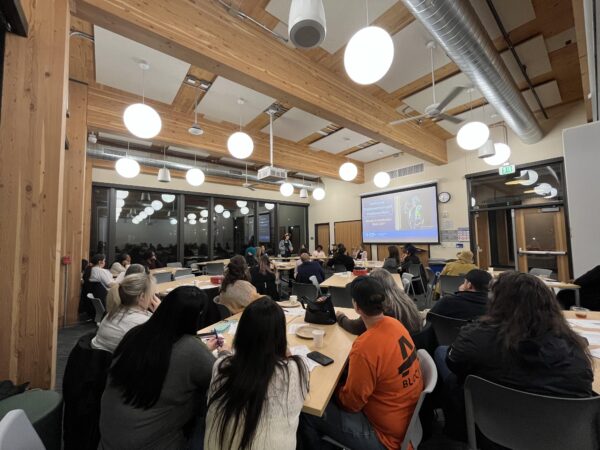 Following Isis’s powerful message, Susan Rodway, Treasurer at IBEW Local 48, moderated a panel discussion with Anjanet Banuelos Bolanos, Business Representative at LiUNA Local 737, Liz Nichols, Business Representative at Cement Masons Local 555, Montana Maurice, Project Engineer at Anderson Construction with Carpenters Local 271, Sharon Maxwell, Owner of Bratton Construction, and Willow Ryan, Co-Chair of Sisters of Iron with Ironworkers Local 29 as they shared about their paths into the trades, experiences with mentors and allies in the industry, and how to take your career to the next level. Three things became clear: Access to pre-apprenticeship training offered a pathway for all these women to find successful careers in construction; Mentors, allies, and a support system in general are crucial for successfully training and retaining women in construction; Women are held to a higher standard than their male counterparts and must go above and beyond to prove their themselves in the field. This panel illuminated the shared experiences of tradeswomen across trades, provided insight into where we are, and painted a picture of what the future could look like if we continue to collaborate on this important work.
Following Isis’s powerful message, Susan Rodway, Treasurer at IBEW Local 48, moderated a panel discussion with Anjanet Banuelos Bolanos, Business Representative at LiUNA Local 737, Liz Nichols, Business Representative at Cement Masons Local 555, Montana Maurice, Project Engineer at Anderson Construction with Carpenters Local 271, Sharon Maxwell, Owner of Bratton Construction, and Willow Ryan, Co-Chair of Sisters of Iron with Ironworkers Local 29 as they shared about their paths into the trades, experiences with mentors and allies in the industry, and how to take your career to the next level. Three things became clear: Access to pre-apprenticeship training offered a pathway for all these women to find successful careers in construction; Mentors, allies, and a support system in general are crucial for successfully training and retaining women in construction; Women are held to a higher standard than their male counterparts and must go above and beyond to prove their themselves in the field. This panel illuminated the shared experiences of tradeswomen across trades, provided insight into where we are, and painted a picture of what the future could look like if we continue to collaborate on this important work.
As Donna Hammond, Interim Executive Director of Oregon Tradeswomen, took the stage, she shared how struck she was by the collective passion and dedication that filled the room. Being a native Portlander born into a strong union family, and someone who became a pioneer for black women in construction in her 40+ years as a Union Electrician, Donna spoke about how humbled and inspired she was to share the stage with so many leaders in the tradeswomen movement. She reminded the crowd that “we convene here today not just as attendees, but as master builders and narrators of our own unique stories.” By sharing and amplifying these stories, Donna says “we lay a foundation for future growth and change in our industry.” Donna also announced a new and exciting partnership between Oregon Tradeswomen, IBEW Local 48, and the Department of Energy to create pathways for African American women and other women of color to enter the skilled trades with a focus on being certified as electrical vehicle changing station installers. We are excited to progress our mission to diversify the trades while providing access to high-wage careers that utilize cutting-edge technology in this new era of green energy infrastructure.
Donna closed out the event by circling back to the theme of the night, asking “Who holds the key?” to which the room exploded in a cheer of “We are the key!” The enthusiasm of the attendees was palpable, and sharing space in this beautiful new building was the perfect way to kick off Women in Construction Week. Thank you to the Women’s Bureau and Portland Community College for collaborating on this inspiring event and showing unwavering commitment to our cause. Together, we hold the key to building a more inclusive future for women in construction.
Remembering Aida
On February 27th, we lost a dear member of Oregon Tradeswomen’s community. Aida Aranda was a strong force, an inspiring person, and a growing leader.
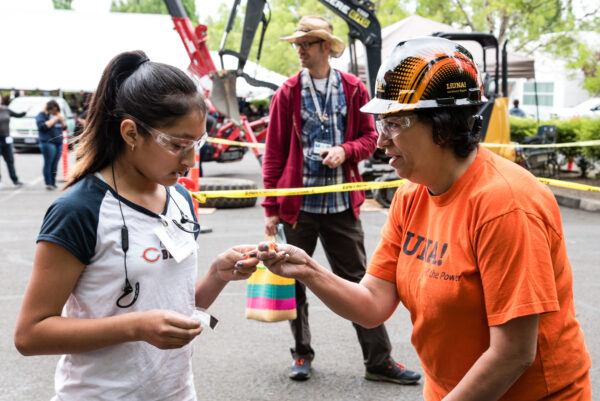
As a 25-year member of LiUNA and Local 737, Aida knew firsthand how important construction careers are for individuals, families, and entire communities. She also knew that these careers were critical for women looking to build a better life. Aida was dedicated to mentoring women coming up in the trades while also working as a Dispatcher for LiUNA Local 296, Apprenticeship Coordinator for the Oregon Southern Idaho Laborers-Employers Training Trust (OSILETT), Market Representative for the Northwest Regional Organizing Coalition (NROC), and eventually as the Training Director of the OSILETT. Aida also served on Oregon Tradeswomen’s Board of Directors for many years and was heavily involved in our current laborers-focused pre-apprenticeship training in The Dalles. These are only a fraction of the many ways Aida was involved in the labor and tradeswoman movements.
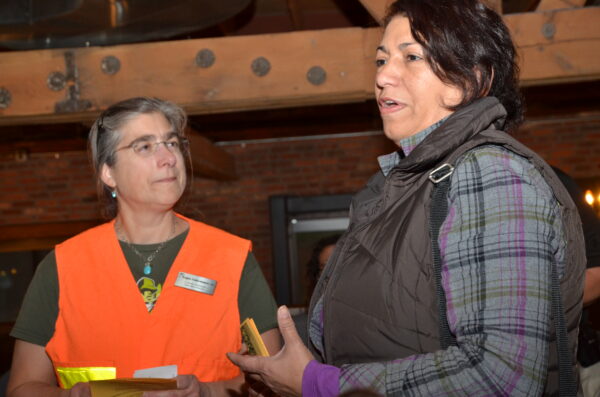
Oregon Tradeswomen mourns this deep loss with her family, friends, and extended communities spanning from the Oregon and Southern Idaho Laborers Employers Training Trust to the Oregon AFL-CIO, where she was elected as an officer in December of 2022.
We encourage everyone who knew and loved Aida to embody her passion for defending worker’s rights and support women who are paving their way into the skilled trades. If you have any photos, videos, and/or memories of Aida, we encourage you to share them with her community online. To honor Aida’s legacy, you are invited to join her extended community at her celebration of life.
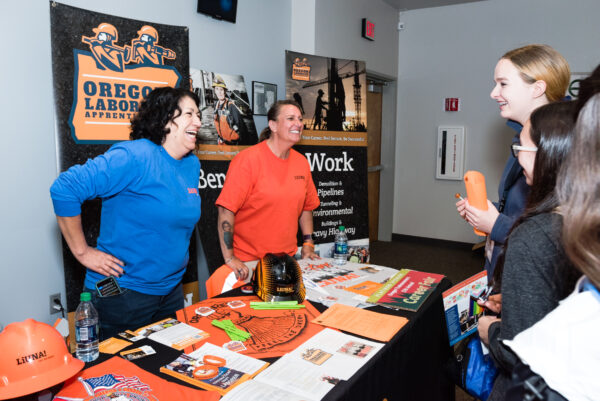
Celebration of Life for Aida Aranda
Saturday March 25th, 2023
11:00 am to 2:00 pm
Oregon & S. Idaho Laborers’ Training Center & Campus
17242 NE Sacramento St.
Portland, Oregon
To help the hosts plan accordingly, please complete the following RSVP by March 22, 2023.
https://forms.gle/AuypH4DgzKCQCbxk7
For those wishing to send flowers, please send to:
OR & S. Idaho Laborers Training Trust
17242 NE Sacramento St.
Portland, OR 97230
For those who would like to contribute a donation in honor of Aida,
Please make checks payable to the “Aida Aranda Benevolence Fund” and mail to:
OR & S. Idaho District Council of Laborers
17230 NE Sacramento St., Suite 201
Portland OR 97230
2023 Women in Construction Week
Women in Construction Week is an annual event started by The National Association of Women in Construction (NAWIC) in 1998 to honor women in the construction industry and promote the opportunities for women in this industry. This year Women in Construction Week falls on March 5 – March 11, making this the 25th year of celebrating women in construction!
This year’s theme is “Many Paths, One Mission,” focusing on the different journeys women have taken toward the goal of strengthening and amplifying the success of women in the construction industry. Join NAWIC, unions, construction firms of all sizes, and organizations like Oregon Tradeswomen in participating in Women in Construction Week events and show support for tradeswomen online!
Women in Construction Week Events
Saturday, March 4:
Women in Construction Week Kick-Off
Monday, March 6:
DE&I Panel: Hot Topic Discussion with Leading Women in Construction
Tuesday, March 7:
Walsh Construction Job Site Tour
Wednesday, March 8 (International Women’s Day):
NAWIC + Dovetail Trunk Show
UA290 + PMCA Women in Construction Week Top Golf Event
Thursday, March 9:
Establish Balance & Avoid Burnout Webinar
Night With NAWIC
Friday, March 10:
Women in Construction Week Build Day @ Habitat for Humanity
Zoom Wine Tasting with Pairings
Saturday, March 11:
Women in Construction Week Toast & ReCap
The 2022 Tradeswomen Build Nations Conference
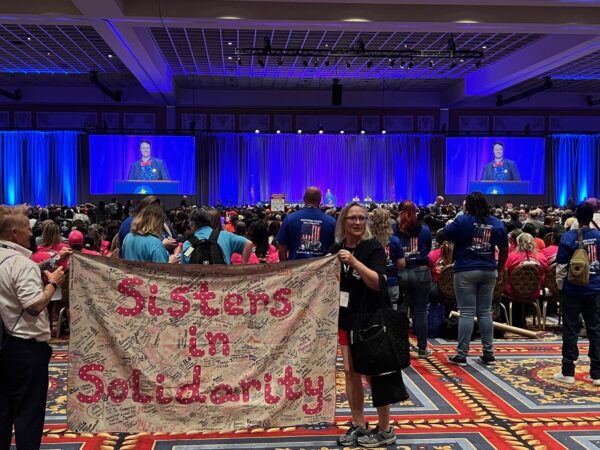
The largest gathering of tradeswomen in the world recently reconvened in Las Vegas for the 2022 Tradeswomen Build Nations (TWBN) conference! The 2022 event was the biggest one yet with more than 3,000 tradeswomen and allies attending.
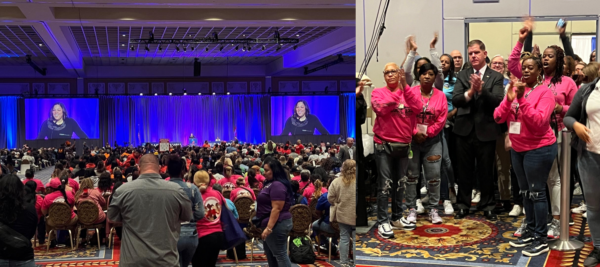
The conference officially kicked off Saturday, October 29th with a Plenary session hosted by Vicki O’Leary, Chair of NABTU’s Women’s Committee, and Erica Stewart, National Coordinator of Women in Trades Initiatives for the Boilermakers. They invited notable speakers from the Presidents of the Las Vegas Raiders and the AFL-CIO, to United States Secretaries of Labor and Commerce, Marty Walsh and Gina Raimondo. There was also a special surprise seeing Oregon Tradeswomen graduate, and union electrician with IBEW Local 48, Kennitha Wade introduce one of the speakers. Hearing so many high-level change-makers come together in passionate support of the tradeswomen movement was exhilarating. Each speaker shared about their background and how it connects them to our cause on a personal level. It was an important reminder that we are not alone in this work—the fight for the advancement of women in construction is turning heads and attracting attention far beyond our local communities. With buy-in from our leaders, lasting change is within reach.

With vibrant energy emanating from the Paris Las Vegas Convention Center, thousands of tradeswomen banded together by trade for the fan-favorite tradeswomen banner parade. Working their way through the casino and out into the streets, heads turned as women in construction chanted and cheered in exuberant joy. We wondered how many of these bystanders have ever seen or thought about the prospect of women as trades-workers. Some folks pulled out their phones to record, some joined in cheering on the tradeswomen, all were struck by the energy that radiated from the parade. Carol Murray, Training Coordinator for Oregon Tradeswomen exclaimed, “Seeing our OTW graduates with their locals and walking in the banner parade with their respective trades was SPECTACULAR!!! Their energy was palpable and contagious!”
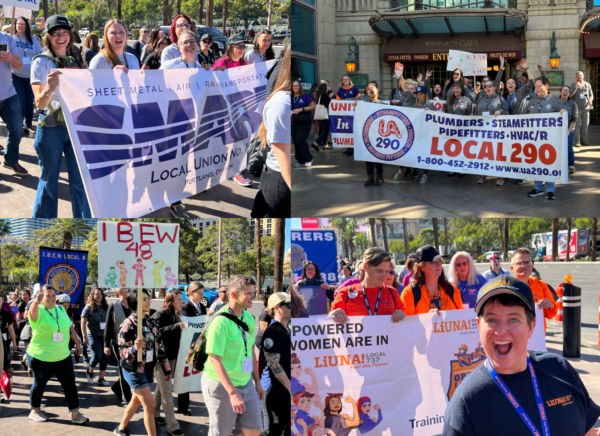
After demonstrating the power of the tradeswomen movement across the Las Vegas Strip, attendees self-selected into workshops that ranged from “Developing Tradeswomen Affinity Groups Within Your Local,” to “Childcare Strategies That Work for Tradeswomen,” and even “How to be a Male Ally in the Union Construction Industry.” The conference offered engaging workshops for everyone.
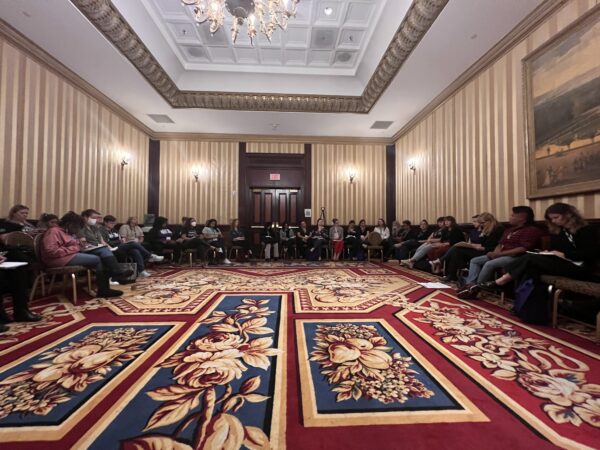
The day ended with Caucus meetings by trade and even included a meeting for researchers and non-profit organizaitons. Oregon Tradeswomen staff attended the “Researchers and Non-Profit Caucus” where people from organizations across North America came together to share data and best-practices to better serve women in the trades. Being an organization in such a niche movement can make it hard to find other people doing the same work, so having this space to hear what is and isn’t working for others is incredibly valuable as we continue serving tradeswomen in our community. “Meeting and collaborating with other pre-apprenticeship programs with the goal of adapting and growing in today’s ever-changing landscape was invaluable,” Carol added.
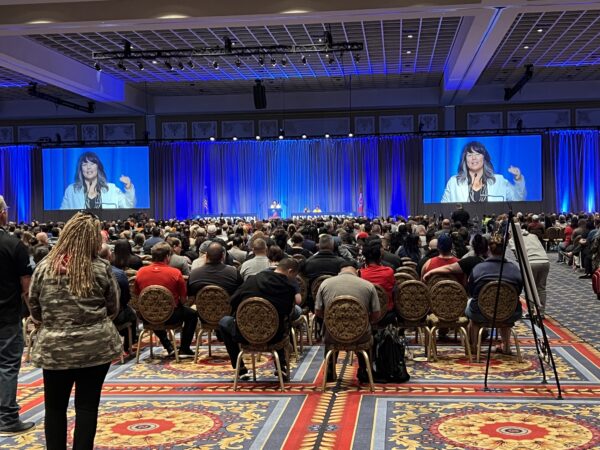
On Sunday, conference attendees heard from more prominent speakers such as Wendy Chun-Hoon, Director of the Department of Labor Women’s Bureau, and Timothy J Driscoll, President of the International Union of Bricklayers and Allied Craftworkers, re-iterating their commitment tradeswomen. The morning plenary session ended with a panel on the retention and recruitment of women in the trades, an always-important discussion as more women than ever are interested in construction careers, but many leave due to harassment, childcare issues, and other issues on the jobsite. Important discussions continued in the next block of workshops where topics included “Women in Union Leadership,” “Protecting Workers’ Mental and Physical Health and Safety,” and “How to Address Bullying, Harassment, and Intimidation.”
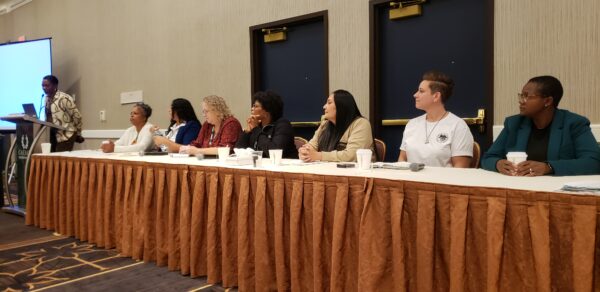
Following the Sunday workshop session, Oregon Tradeswomen graduates and other Portland tradesworkers in the Tradesworker Equity Council (TEC) presented at the Tradeswomen Task Force’s Policy Forum. About 120 people attended, ranging from trades-workers to policy-makers, and seemed captivated by the experiences shared by the TEC. Union officials Scott Oldham from IUPAT in Portland and Charles Greer, Pittsburgh SMART Organizer, shared that this was the best workshop they attended the whole conference, and that they learned so much from the vulnerability of the TEC.
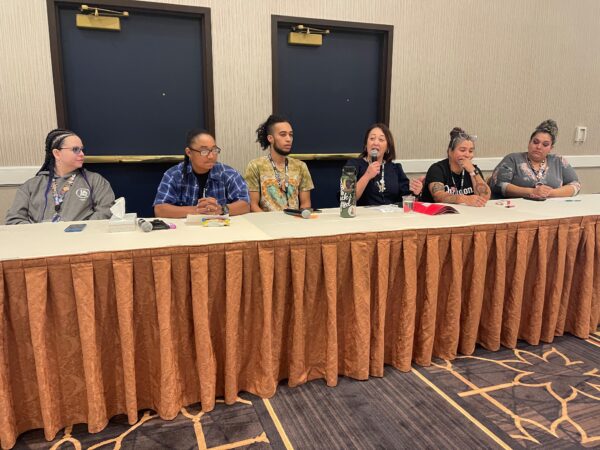
This was a first-time Tradeswomen Build Nations experience for most of the Oregon Tradeswomen staff who attended the conference. “The conference reminded me that I’m not alone, and our organization isn’t alone,” Pathways Training Coordinator Kate Hibbs shared. “Hearing that we’re only 3% of the industry nationwide feels so small, and we can feel so small in the field, but being in a group of over 3,000 at this conference, plus thinking of the other 300,000 women and gender minorities out there—we can’t be erased, we won’t be erased! We want to be in the trades and we are doing what we can so that anyone can be here if they want to.” This idea that we can’t and won’t be erased is a driving factor for the spirit that this conference embodies. It is a constant battle, but we are pushing forward into a better future together. We can’t wait to see how much progress can happen by the time we gather again in 2023.
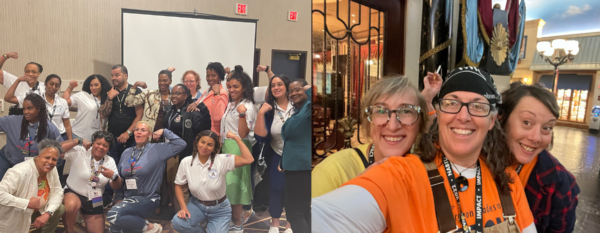
In Her Own Words: Jen Brallier’s Pathway to Apprenticeship
When Jen Brailler, an educational assistant, reached out to us for help making a career change, our team worked with her to figure out her next steps. From answering her questions, helping her identify which trade was the best fit, and providing support during her apprenticeship application process, Jen got the help and advice she needed to demystify the confusing, and sometimes overwhelming process, to start her new career. Here is Jen’s story in her own words:
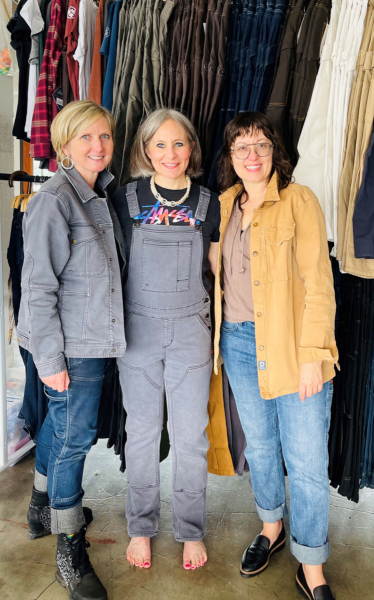
From Left to Right: Sara DeLuca, Dovetail Workwear Founder; Jen Brailler, Apprentice Bricklayer; Rachelle Waldie, Dovetail Workwear
“I have been an Educational Assistant for the Reynolds School District for 17 years, supporting students with special needs. I have so much passion for the work and care deeply for the students and their success. However, over time, there has been a growing lack of support, respect, and resources for the needs of teachers. Because I care so much for the students and have enjoyed my work, it’s been difficult to try for something else for a long time. This was the year that really gave me a kick-start into pursuing something new.
“Working for a school district, we help students with post-high school options often, so I’ve known about the trades for some time. I knew I didn’t want to accumulate loans at this point in my life and that led me to look in to pursuing a trade. I like to build things and get creative in my spare time, so I thought making that a career could be really cool! I learned about Oregon Tradeswomen while researching what trades careers are out there and I decided I would contact them to get a little more information… And I’m so happy I did!!
“Going into something new, I had so many questions for them! I was astonished at the immediate support and responses. Oregon Tradeswomen offers frequent Social Hours full of a lot of wonderful information as well as question and answer sessions, but they also took so much time to help me individually! Oregon Tradeswomen was able to answer pretty much all of my questions, and connected me to people and resources to answer the questions they didn’t have all the answers to. And my goodness, did I have A LOT of questions!
“Some of my many questions were:
Inquiries about application processes, which trades are most physically demanding, what Oregon Tradeswomen’s pre-apprenticeship offers, what gear I might need for a certain trade, how can I best support my health and safety in the work, gathering information and contacts for the trade I am interested in, contacts of people who have been working in a certain trade so that I can ask them about the work, all the forms I needed to have ready for application process, and SO much more!
“I believe through emails alone, Oregon Tradeswomen’s team spent at least 10-12 hours with me – I’m sure more at this point! I eventually secured an interview with BAC Local 1 and I was feeling extremely nervous about it. Oregon Tradeswomen was able to connect me with someone who could help me practice some of the questions that are most commonly asked during the BAC apprenticeship interview! Amazing.
“Oregon Tradeswomen gave me website resources for the clothing lines they partner with to help me get started with brand new work boots and clothing. They even went above and beyond and set up a meeting time with me and Dovetail Workwear for a workwear fitting!
“ALL of the emails and in-person interactions with Oregon Tradeswomen have had a caring, supportive vibe! I haven’t even started my apprenticeship yet, and I already feel so much acceptance and love. I am positively overwhelmed and overjoyed with all that I have received so far.
“The compensation Oregon Tradeswomen gets for their work doesn’t cover the support they gave me, but they still helped me so much because they have hearts of Gold! They need a full-time staff-person who can give the kind of support that I got because it was incredibly helpful and gave me full confidence in pursuing my trade! I wasn’t sure about making this huge leap into a new career, but Oregon Tradeswomen assured me that it would change my life for the better. They motivated me in a way that I have not experienced before. I know I’ve shed some tears from the support, love, and kindness they have shown me! Women going into this type of work NEED the kind of motivation Oregon Tradeswomen offers…
“At 43 years old, I will be starting a Bricklayer Apprenticeship with BAC Local 1 in July! I owe Oregon Tradeswomen most, if not all, of the credit for my firm and confident decision in this New Beginning of my life!
With love,
Jen Brallier”

